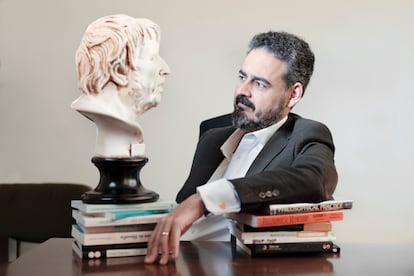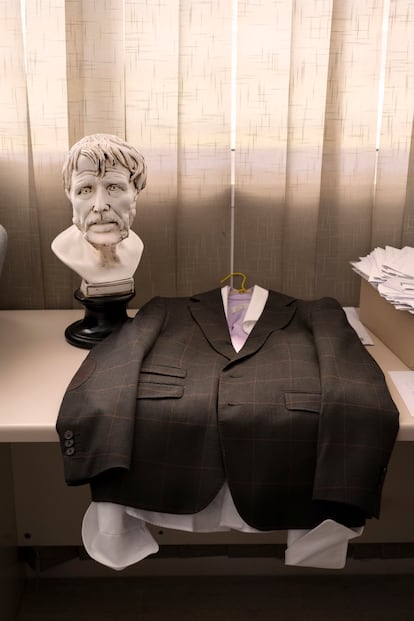Feeling angst? Better call your philosophical therapist
José Barrientos-Rastrojo is an expert in ‘philosophical advice’ that helps people deal with their existential problems. He also heads a pioneering project that applies the methodology at prisons in Spain, Colombia, Mexico, Argentina and Brazil

José Barrientos-Rastrojo, 47, awaits the arrival of a package at his home in Seville, in southern Spain. Although he is anticipating the sound of the doorbell, it never happens — instead, the doorbell rings in this reporter’s home just as our telephone interview has begun. The truth is, Barrientos does not have much time to wait around for packages. In addition to teaching at the University of Seville, he directs the BOECIO project, a pioneering applied philosophy program taught in prisons in Spain, Colombia, Mexico, Argentina and Brazil. “It is the first initiative of this type in prisons, the first empirical research that involves more than 500 prisoners,” says this scholar whose intense work schedule requires him to make frequent transcontinental trips.
The most striking thing about his career is the natural way in which he overcomes the intuitive discrepancy between philosophy and entrepreneurship. He has the same ability to organize an international conference of philosophers as he does to explain Heidegger in a couple of minutes. “I have always been very forward-thinking,” admits Barrientos, who before teaching philosophy wanted to study medicine but didn’t get a high enough grade and so went into nursing. He remembers: “It was clear to me that I wanted to help people have a better life.”
His life took a decisive turn the day he discovered that philosophy also served to improve people’s lives. He describes it as “an Ortegian revelation” (after the philosopher Ortega y Gasset): the immediate understanding of a fundamental truth that is revealed to the individual not through arguments, but as an evident and direct manifestation of reality. “Once you discover that truth, you can no longer be the same person you were before,” says Barrientos, alluding to the moment when he joined the philosophical advice group at the University of Seville.
He was a third-year college student pursuing a dual degree in Philosophy and Nursing. At that point he had never heard of a practice that goes by various names, including philosophical consultation, philosophical guidance or philosophical advice, and which back then was even more obscure in Spain than it is today. The dynamic is as follows: a client goes to a philosopher’s office, explains their existential dilemmas and together they explore the latter’s philosophical dimensions. It was the perfect synthesis of Barrientos’ passion for critical thinking and desire to directly help people. “There are problems that are frequently confused with psychological issues, when they really have a philosophical background. A great scourge of our society is not being able to respond to people’s philosophical conflicts,” he explains.

He was captivated by this methodology and opened a practice where he offered free philosophical advice to friends and acquaintances. At the same time, he continued to train through intense research work and by attending talks and conferences. At the age of 25, he organized the International Congress of Philosophical Counseling in Seville, the first in Spain. This early achievement was replicated the following year when, after being invited as a teacher to a summer course, he accumulated enough information to write what would become the first philosophical guidance manual in Spanish, a work that continues to be an essential work of reference in the field. “The important things in my life have almost always arisen by chance, as if I came across them,” he reflects.
After several years of teaching at the University of Seville and working as a philosophical consultant, he decided to change tack. “I realized that many of my clients would not need to come here if they had more critical thinking tools and philosophical habits to face the dilemmas for which they were coming in,” he says. As a result, he chose to replace individual visits with philosophical prevention workshops. The Center for Practical Wisdom at the University of Chicago funded him to launch philosophy workshops in prisons. It was the germ of what would later become the BOECIO project.
This is based on four objectives: strengthening critical thinking, improving interpersonal relationships, managing emotions and increasing the resilience of people deprived of liberty. There are several sets of workshops, each focused on a specific exercise. For example, critical thinking proposes a reverse debate, where participants must defend an opinion contrary to their own. In another type of activity, the objective is for participants to realize that their emotions depend on the way they interpret reality. For example, photos are exchanged in which someone is seen eating chocolate and a cockroach. Participants then reflect on the construction of disgust and the rejection that the second image universally provokes.
The Spanish researcher emphasizes that his workshops do not seek to turn philosophy into a tool to make his patients more functional and productive within the system. “Certain philosophically-oriented therapies or trends such as modern stoicism are often pre-configured with specific objectives that do not necessarily benefit the individual, but rather companies or the health system. Our goal is to promote autonomy and allow people to develop their own thinking, and ensure that their goals and objectives are not imposed by an external power,” he says.
He criticizes the notion of positive thinking as a construct of capitalist society designed to increase worker productivity. He calls it superficial and manipulative. Faced with the tendency to avoid feelings of angst, he believes that philosophy should help people explore it and use it as a resource for self-discovery and recovery of one’s own existence: “Our society labels anguish as something negative, but in reality it is an inherent aspect of being human that, properly harnessed, can become a valuable resource to recover personal authenticity and overcome existential blindness.”
Sign up for our weekly newsletter to get more English-language news coverage from EL PAÍS USA Edition
Tu suscripción se está usando en otro dispositivo
¿Quieres añadir otro usuario a tu suscripción?
Si continúas leyendo en este dispositivo, no se podrá leer en el otro.
FlechaTu suscripción se está usando en otro dispositivo y solo puedes acceder a EL PAÍS desde un dispositivo a la vez.
Si quieres compartir tu cuenta, cambia tu suscripción a la modalidad Premium, así podrás añadir otro usuario. Cada uno accederá con su propia cuenta de email, lo que os permitirá personalizar vuestra experiencia en EL PAÍS.
¿Tienes una suscripción de empresa? Accede aquí para contratar más cuentas.
En el caso de no saber quién está usando tu cuenta, te recomendamos cambiar tu contraseña aquí.
Si decides continuar compartiendo tu cuenta, este mensaje se mostrará en tu dispositivo y en el de la otra persona que está usando tu cuenta de forma indefinida, afectando a tu experiencia de lectura. Puedes consultar aquí los términos y condiciones de la suscripción digital.









































